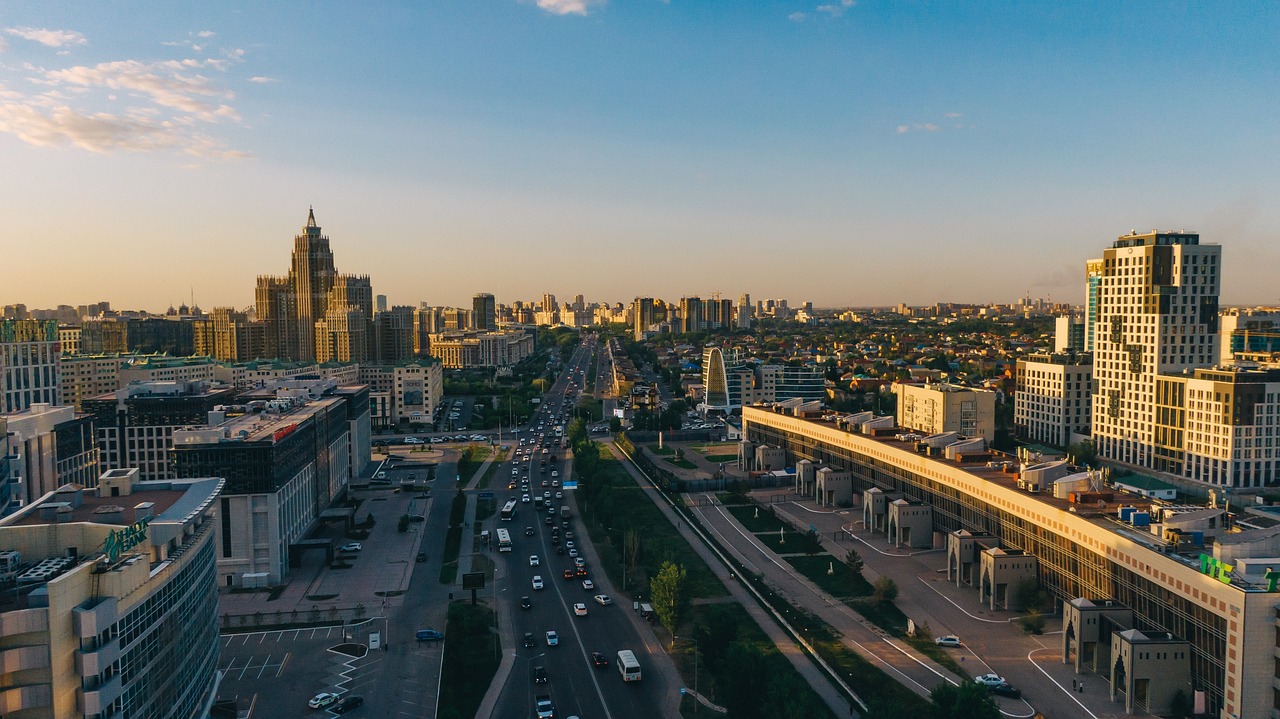In a February 7 op-ed in The Astana Times, Kassym-Jomart Tokayev, the President of Kazakhstan, announced that his country will be hosting the Astana International Forum on June 8-9. The article sheds light on his thinking about the state of world affairs and challenges heads of state and diplomats “to come together to find a new way forward… in an increasingly polarized world.”

Astana. Photo credit: pixabay.com.
“We all know,” Tokayev writes, “that global peace and stability are currently under threat by tensions between major world powers.” He calls for solidarity among the “global middle powers” (his words) to bring the “world powers” collectively to their senses before all hell breaks loose across the planet.
Tokayev claims that his call for a “new international conference” in Astana, the capital of Kazakhstan, would “help set us in the right direction to protect [the international community’s] collective future.” His statement implies that we are headed in the wrong direction.

Javier M. Piedra.
There is also a sense of urgency in his message when he warns that the international community is facing “increased risk” of pursuing “short-term, unsustainable solutions,” which later turn into “long-term problems.” The “global middle powers” understand this.
Tokayev wants his proposed Astana International Forum to serve as a tool for “rebuilding a culture of multilateralism on a global level,” a platform for “global middle powers to discuss their views and positions,” and a way for countries “to put forward their own solutions to issues” that affect them.
As both a head of state and diplomat, Tokayev seems to believe that a unipolar world undermines global stability by hamstringing and kiboshing constructive dialogue between states. What’s more, he maintains that “international systems and alliances” are on “shaky” ground, thereby questioning their effectiveness in mediating complex conflicts or promoting unity in the international arena.
In today’s highly explosive geopolitical environment, Tokayev will not sit idly by and take it on the chin as the world powers appear to be unwilling or unable to maintain international strategic stability. As such, Kazakhstan and the “global middle powers” – he does not identify who they are – need a neutral platform that is free of external harassment, bullying, arm-twisting, empty promises and vain moralizing.
Clearly Tokayev, sensing danger, sees the need for the “global middle powers” to step up, unite in a non-exclusionary fashion (all are invited), and push back on the irresponsible behavior of the “world powers” at this time of crisis.
In this way, he says, countries stand a better chance to defend themselves against the reckless behavior of inveterate global elites who often see the common good as best served by militarism and opportunism in a ruthless Hobbesian dog-eat-dog world (as long as it doesn’t affect them personally).
Why Kazakhstan?
According to Tokayev, Kazakhstan believes in having “a true spirit of mutual respect” toward others, which explains “why the value of global cooperation comes naturally to us. It is in this spirit that we have crafted our multi-vector foreign policy, which has served us well for many years.” Moreover, “Kazakhstan is committed to global cooperation by championing dialogue, trade, multilateralism, and the exchange of ideas.”
In essence, Tokayev wants to share his foreign-policy experience to help reduce tensions and bring about win-win geo-economic outcomes and integration not only across Eurasia but elsewhere.
Kazakhstan’s brand of foreign policy is called diplomacy, or statecraft, which may no longer be in vogue in many world capitals but continues to have its adherents and practitioners among the “global middle powers” in and beyond Eurasia.
Given increased tensions, Tokayev fears that the “sharp economic downturn globally, with many nations, businesses, and individuals struggling to stay afloat” may turn ugly indeed.
As such, the Astana International Forum will try to get the international community to focus on the world “economy and finance, highlighting the need for a coordinated global response to economic, environmental, and security challenges,” which should take into account the good of nations, beginning with local communities and families.
Tokayev further notes that “rising income inequality” across the globe “causes instability,” suggesting that the reigning economic model of most governments and financial institutions (which, although it is not mentioned by name in the article, could be called neo-liberalism) has mostly failed the developing world and the middle class holistically.
Optimism without naïveté
Tokayev seems to be an optimist. “While [international] challenges may seem daunting,” he says, “they can also be seen as opportunities for global cooperation and progress. By working together, the international community can address these issues at the Astana International Forum and contribute to a more stable, equitable, and prosperous world for all.”
Kazakhstan is well suited to serve as a bridge between East and West, North and South, because of, in Tokayev’s words, the country’s “unique history and geography.” Perhaps the “global middle powers” will take Tokayev up on his offer, rise up, figuratively speaking, and sign on to his program of diplomatic engagement in an over-militarized and polarized world.
The author is Javier M. Piedra, a financial consultant, specialist in international development and former deputy assistant administrator for South and Central Asia at USAID.
This opinion was first published by Asia Times and is reprinted with the author’s permission.

